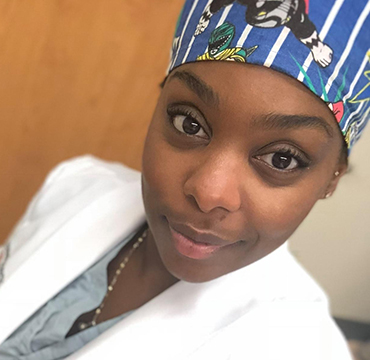Alexandra Bastiany is the first Black woman in Canada to become an interventional cardiologist
(a branch of cardiology that treats structural heart disease using techniques like cardiac
catheterization, angioplasty and stents). When she graduated with honors from the Université de
Montréal (UdeM) Faculty of Medicine, she was the school’s first Black valedictorian.
Bastiany was born and raised in Montréal. Her parents, who had come to Canada from Haiti,
influenced Bastiany’s interest in science and medicine. Her father was a chemist and when
Bastiany was a child, her mother studied to become a nurse. So, while she was growing up,
Bastiany had access to lots of books on scientific topics, including human anatomy. This piqued
her interest in the heart and the cardiovascular system; even as child, sensed she would become a
cardiologist.
After graduating from UdeM, Bastiany completed a fellowship in interventional cardiology at
the Mazankowski Alberta Heart Institute in Edmonton; it is part of the University of Alberta. She
now works at the Thunder Bay Regional Health Sciences Centre in Thunder Bay, Ontario.
Bastiany is multi-lingual, and speaks fluent English, French, and Haitian Creole. She has a strong
interest in community work with Black people and persons of colour. When she was studying at
UdeM, she partnered with La Maison d’Haïti, organizing educational sessions on common health
issues that affect Montréal’s Haitian community. For her work, she won second-place in the
Fédération des médecins résidents du Québec (FMRQ) Excelsior awards.
Bastiany has also worked with other community organizations, and started career days for
minority children and children from underserved communities, to inspire and encourage them
with role models. She works to decrease the race and gender biases that lead to disparities in the
quality of care and clinical outcomes. She works with the Canadian Heart Health Alliance to
advocate for better cardiovascular care for women.
Bastiany also actively works to bringing more people of colour and women to the field of
interventional cardiology. In a recent interview, she noted that “…[w]omen make up maybe six
per cent of the pool of interventional cardiologists.” She hopes her work in the field will inspire
others who look like her to consider working in medicine, particularly in cardiology.
Open about the challenges she has faced, Bastiany notes that racism does affect her working
relationships, and how patients perceive and interact with her. In a 2023 interview, she said that
“…it would sometimes be really hard for them to understand, even realize, that there were some
microaggressions happening.”
Nevertheless, Bastiany is proud of her profession, noting that many health professionals are
working to improve conditions for and the representation for people of colour. She works on a
Canadian Cardiology Society committee that in 2022, launched an Equity, Diversity and
Inclusion working group that is committed to raising awareness about and finding solutions to
this issue.
In 2022, Prime Minister Justin Trudeau mentioned Bastiany in his statement for Black History
Month, saying: “Black Canadians and their communities have a long history of being trailblazers
and change makers. Among them is Dr. Alexandra Bastiany, an advocate for diversity in
medicine…”
(Sources: CityNews Everywhere interview (Feb. 23, 2023), CVUpdate 2022, Canadian Women’s
Heart Health Centre Knowledge Translation and Mobilization Working Group Member Profile)


Recent Comments